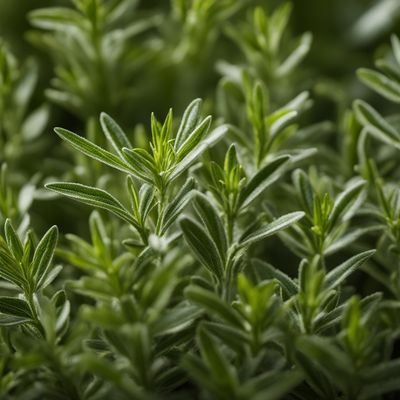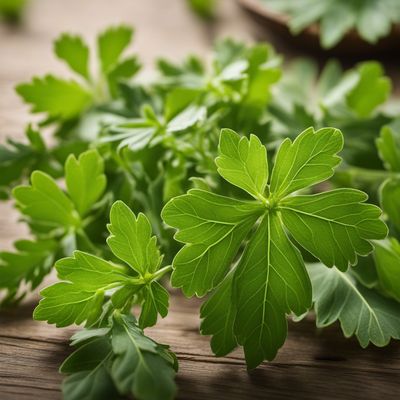
Ingredient
Wintergreen leaves, dry
Nature's Minty Delight
Wintergreen leaves are small, dark green leaves with a strong minty flavor and aroma. They have a slightly crunchy texture and can be used whole or crushed to release their essential oils. The taste is reminiscent of mint, with a subtle sweetness and a hint of spiciness. Wintergreen leaves are a versatile ingredient that can be used in both sweet and savory recipes.
Origins and history
Wintergreen leaves have a long history of use in traditional medicine and culinary practices. They are native to North America and have been used by indigenous peoples for centuries. Wintergreen leaves were traditionally brewed into teas or used topically for their analgesic and anti-inflammatory properties. In culinary applications, they are often used to flavor candies, gums, and beverages. Today, wintergreen leaves are widely available and enjoyed in various cuisines around the world.
Nutritional information
Wintergreen leaves are a good source of antioxidants and contain compounds like methyl salicylate, which has analgesic and anti-inflammatory properties. They are also low in calories and carbohydrates, making them a healthy addition to dishes and beverages. However, it's important to note that wintergreen leaves should be used in moderation due to their potent flavor and potential side effects if consumed in large quantities.
Allergens
Wintergreen leaves may cause allergic reactions in individuals who are sensitive to aspirin or salicylates. It's advisable to consult with a healthcare professional if you have any known allergies or medical conditions before consuming wintergreen leaves.
How to select
When selecting dried wintergreen leaves, look for ones that are whole, intact, and free from discoloration or signs of moisture. The leaves should have a strong minty aroma. It's best to purchase from reputable sources to ensure quality and freshness.
Storage recommendations
To maintain the freshness and flavor of dried wintergreen leaves, store them in airtight containers in a cool, dark place. Avoid exposing them to heat or moisture, as this can cause them to lose their potency. Properly stored, dried wintergreen leaves can last for up to a year.
How to produce
Wintergreen leaves can be grown at home in a garden or in pots. They prefer well-drained soil and partial shade. Harvest the leaves when they are fully grown and dry them by hanging them upside down in a cool, dark place. Once dry, store them in airtight containers away from light and moisture.
Preparation tips
Dried wintergreen leaves can be used in a variety of ways. They can be steeped in hot water to make a refreshing tea or infused into oils or vinegars for added flavor. Crushed wintergreen leaves can be used as a seasoning in both sweet and savory dishes, such as desserts, marinades, or dressings. They are also commonly used to flavor candies, gums, and mouthwashes.
Culinary uses
Wintergreen leaves are commonly used in North American and Scandinavian cuisines, where they are prized for their minty flavor. They are particularly popular in candies, gums, and beverages, such as wintergreen mints and sodas.
Availability
Wintergreen leaves are native to North America and are commonly cultivated in regions with temperate climates, such as the United States and Canada. They can also be found in some parts of Europe and Asia.
More ingredients from this category » Browse all

Marjoram, dry
Discovering the Aromatic Delights of Dry Marjoram

Savory, dry
Umami Delight

Thyme, dry
The Essence of Thyme: A Versatile Herb

Basil, dry
The Fragrant Herb: Dried Basil

Angelica, dry
The Heavenly Herb: Unveiling the Secrets of Dry Angelica

Lovage, dry
The Aromatic Herb: Lovage

Sage, dry
The Timeless Herb: Unveiling the Versatility of Dry Sage

Borage, dry
The Vibrant Herb of Delight

Bay leaves, dry
Aromatic Leaf of Flavor

Celery leaves, dry
The Flavorful Herb: Dry Celery Leaves

Wormwoods, dry
The Bitter Herb: Wormwoods

Sweet cicely, dry
The Delicate Herb: Sweet Cicely